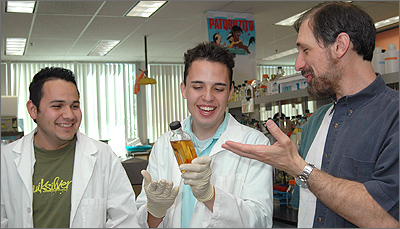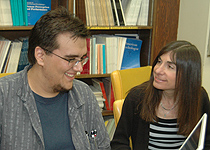| Two
New Scholars Named to MARC Program |
|||||
|
|||||
| Minority Access to Research Careers
program exposes students to the type of research and skills that will
help them enter and succeed in graduate programs.
September 29, 2005 Two students are learning what it takes to be research scholars as they probe DNA replication related to antibiotics and twin behavior under a federally funded program that encourages them to consider futures as scientists. Timothy Richard Parenteau, a junior biological science major, and Kevin Chavarria, a senior psychology major, are the latest scholars in Cal State Fullerton’s Minority Access to Research Careers (MARC) program. The program was established 10 years ago with funding from the National Institutes of Health. This year, the program is supported with a $247,080 NIH grant. The goal, says Amybeth Cohen, associate professor of biological science and MARC director, is to expose undergraduate students to the type of research and skills that will help them enter and succeed in graduate programs. “The idea is to give them the preparation to compete for slots at the top schools in the country.” Chavarria has always been interested in conducting psychology research, so the opportunity to join the MARC program seemed fortuitous. He is the first student outside the College of Natural Sciences and Mathematics ever selected for the program. Earlier this year, he began working with Nancy Segal, professor of psychology, on a study on how fraternal and identical twins perceive their twin sibling’s children in various aspects of their lives. “I like the experience, and have learned a lot about research,” said Chavarria, who already has attended two conferences and will be preparing posters and writing papers to present at future conferences. “I know now that I definitely want a future in research and will be looking into a doctoral program geared toward that.” “It’s great to have a bright young, enthusiastic undergraduate interested in research,” said Segal. “I get great pleasure in being able to share my experiences and help Kevin toward a terrific career.” Parenteau has been working in the lab of Marcelo Tolmasky, professor of biological science. As part of his research, Parenteau is watching the replication of antibiotic DNA using equipment that photographs DNA in real-time. “So far I have been learning about the equipment and drawing samples,” said Parenteau, who plans to specialize in medical research. “You learn different concepts in class and hear about their applications, but you can’t really visualize it until you’re in the lab, doing the research. It makes everything come to life.” The MARC program “offers students the opportunity to do research and not have to work [off-campus] or worry about funding,” said Tolmasky. “These kinds of programs are great.” Chavarria and Parenteau join continuing MARC scholars Diego Miranda and Paul Gerard. The two biological science seniors spent the summer working in labs in England, gaining experience in and exposure to the atmosphere of a doctoral-level research facility. Miranda, who works with Tolmasky, and Gerard, who conducts research under the direction of Cohen, are expected to graduate next year. Students selected for the program must carry a minimum 3.2 grade-point average and be interested in research as a career, said Cohen. Program participants are required to complete specific science courses, conduct an average of 15 hours of research per week during both semesters of the academic year and full time for eight weeks in the summer, conduct a specific research project that will culminate in a senior thesis, and defend their findings before a thesis committee at the end of the program. MARC scholars attend weekly seminars where they read scientific papers, learn how to develop research presentations and hear from guest speakers they invite to the sessions. They also are expected to attend and deliver presentations on their work at local and national professional meetings. The program provides each student with an annual stipend of about $10,000, as well as funding for travel, supplies and materials. MARC also pays participants’ school fees and provides a GRE preparation course. “It’s a lot of hard work,” said Cohen, who has mentored five previous scholars. “We expect a lot of them. But if they rise to the challenge, they do well.” Since 1995, 23 students have completed the two-year program and gone on to graduate and doctoral programs at UC Irvine, UC San Diego and USC. |
|

